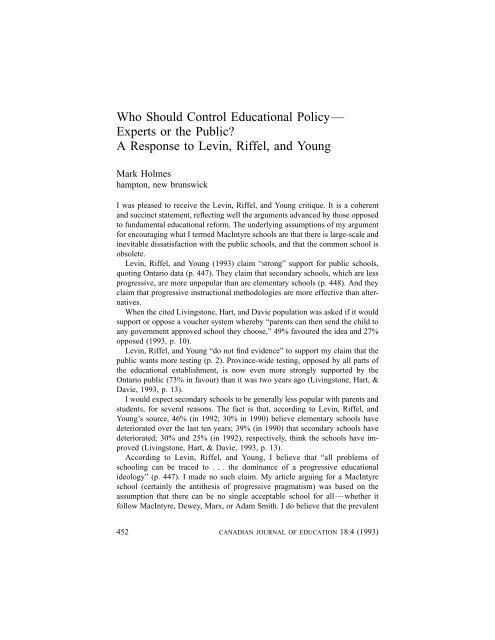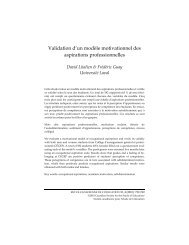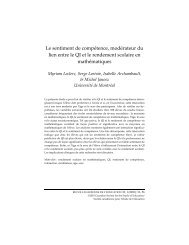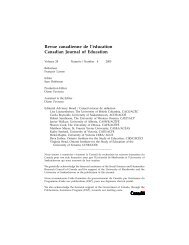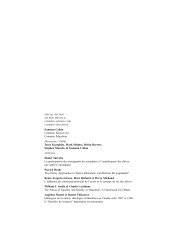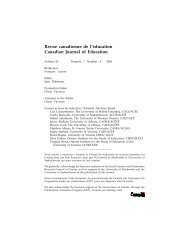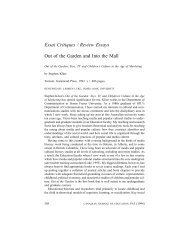Mireille Falardeau et Michel Loranger Le choix de stratégies ... - CSSE
Mireille Falardeau et Michel Loranger Le choix de stratégies ... - CSSE
Mireille Falardeau et Michel Loranger Le choix de stratégies ... - CSSE
Create successful ePaper yourself
Turn your PDF publications into a flip-book with our unique Google optimized e-Paper software.
Who Should Control Educational Policy—<br />
Experts or the Public?<br />
A Response to <strong>Le</strong>vin, Riffel, and Young<br />
Mark Holmes<br />
hampton, new brunswick<br />
I was pleased to receive the <strong>Le</strong>vin, Riffel, and Young critique. It is a coherent<br />
and succinct statement, reflecting well the arguments advanced by those opposed<br />
to fundamental educational reform. The un<strong>de</strong>rlying assumptions of my argument<br />
for encouraging what I termed MacIntyre schools are that there is large-scale and<br />
inevitable dissatisfaction with the public schools, and that the common school is<br />
obsol<strong>et</strong>e.<br />
<strong>Le</strong>vin, Riffel, and Young (1993) claim “strong” support for public schools,<br />
quoting Ontario data (p. 447). They claim that secondary schools, which are less<br />
progressive, are more unpopular than are elementary schools (p. 448). And they<br />
claim that progressive instructional m<strong>et</strong>hodologies are more effective than alternatives.<br />
When the cited Livingstone, Hart, and Davie population was asked if it would<br />
support or oppose a voucher system whereby “parents can then send the child to<br />
any government approved school they choose,” 49% favoured the i<strong>de</strong>a and 27%<br />
opposed (1993, p. 10).<br />
<strong>Le</strong>vin, Riffel, and Young “do not find evi<strong>de</strong>nce” to support my claim that the<br />
public wants more testing (p. 2). Province-wi<strong>de</strong> testing, opposed by all parts of<br />
the educational establishment, is now even more strongly supported by the<br />
Ontario public (73% in favour) than it was two years ago (Livingstone, Hart, &<br />
Davie, 1993, p. 13).<br />
I would expect secondary schools to be generally less popular with parents and<br />
stu<strong>de</strong>nts, for several reasons. The fact is that, according to <strong>Le</strong>vin, Riffel, and<br />
Young’s source, 46% (in 1992; 30% in 1990) believe elementary schools have<br />
d<strong>et</strong>eriorated over the last ten years; 39% (in 1990) that secondary schools have<br />
d<strong>et</strong>eriorated; 30% and 25% (in 1992), respectively, think the schools have improved<br />
(Livingstone, Hart, & Davie, 1993, p. 13).<br />
According to <strong>Le</strong>vin, Riffel, and Young, I believe that “all problems of<br />
schooling can be traced to . . . the dominance of a progressive educational<br />
i<strong>de</strong>ology” (p. 447). I ma<strong>de</strong> no such claim. My article arguing for a MacIntyre<br />
school (certainly the antithesis of progressive pragmatism) was based on the<br />
assumption that there can be no single acceptable school for all — wh<strong>et</strong>her it<br />
follow MacIntyre, Dewey, Marx, or Adam Smith. I do believe that the prevalent<br />
452 CANADIAN JOURNAL OF EDUCATION 18:4 (1993)


